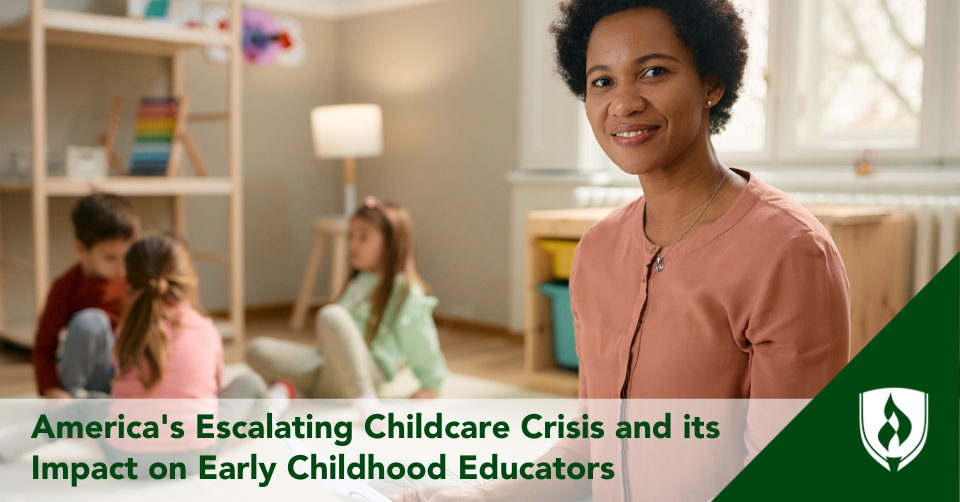America's Escalating Childcare Crisis and Its Impact on Early Childhood Educators
By Robbie Gould on 10/03/2023

In recent years, the United States has grappled with an escalating concern among parents, educators and policymakers alike: a childcare shortage.
With limited to no options for working parents, depending on their area and income, this childcare crisis has many families at wits end, trying to find a way forward with young children.
Whether you're a parent, someone passionate about early childhood education (ECE) or simply curious about the child care crisis, read on for a breakdown of what’s going on in the U.S. and what it means for early childhood educators.
Is there a childcare shortage in the U.S.?
Yes – there is a childcare shortage in the US.
According to the 2022 report from Child Care Aware®, we have a substantial disparity between demand and supply in the childcare industry. The report revealed that while 12.3 million children required childcare services in 2022, only 8.7 million slots were available in licensed childcare centers, resulting in a notable gap of 3.6 million spots.1
It’s worth noting that this study did not take family care centers (or home-based childcare businesses) into account. It also does not account for childcare services families obtain through relatives and friends or services families pay for like nannies or babysitters. More research on these childcare options is needed to really determine the extent of the issue (especially if you are looking at childcare deserts).
But even with alternatives, families all over the U.S. struggle to find an available, appropriate and affordable early childhood program, particularly for infants and toddlers. And for some, it’s not even about price, there are just no childcare options at all.
The scarcity of childcare providers and services has been intensified by the closure of childcare centers in the wake of the COVID-19 pandemic, further compounding the already daunting task for parents seeking dependable, affordable childcare options for their children.
How does the childcare shortage impact us?
So, it's bad, that’s no secret – but just how bad is it?
"The current childcare crisis in the United States is a source of profound concern," says Jess Brooks, the ECE specialist at Hess UnAcademy. "The intersection of affordability, accessibility and quality of care has created a perfect storm, leaving parents, children and the economy at large grappling with its consequences."
For parents, the childcare shortage presents a challenging dilemma. It forces them to make agonizing decisions between their employment obligations and caregiving responsibilities. The high costs associated with childcare frequently eclipses a substantial portion of a family's earnings, rendering it financially unfeasible for parents to sustain their careers while guaranteeing their children receive the high-quality care they require.
From the vantage point of early childhood education experts, the childcare shortage is an alarming reflection of a system in dire need of reform.
ECE experts are noticing a decrease in the number of high-quality child care workers, which has only been made worse since the pandemic compelling numerous competent caregivers to leave the profession, citing health concerns, insufficient support and inadequate compensation.
Gallup conducted a survey that yielded unsurprising results: more than half (56%) of Americans surveyed say inflation and price increases are causing financial hardship for their household.2 Add to this, the fact that most low-income families are spending about 35% of their yearly earnings on the child care system, and you can get a deeper glimpse into how and why this issue is growing serious.3
The notion of affordable child care is becoming a paradox with the progression of time.
It's a disheartening trend that seems to intensify with each changing season. While parents strive to provide the best possible care and educational opportunities for their children, the financial burden of childcare expenses has reached a point where it can be daunting.
In a society where the cost of living continues to rise, affordable child care becomes an elusive goal, and parents often find themselves facing tough decisions.
Balancing work, career aspirations and the well-being of their children in this climate of soaring childcare costs is a complex and ongoing challenge. As the seasons change, so does the struggle to afford child care, a dilemma that highlights the urgent need for comprehensive solutions in addressing the childcare crisis.
With that said, the childcare shortage in the United States carries significant consequences for both the economy and parents. Let's explore these implications:
1. Economic impact
Loss of productivity
The shortage has led to parents missing work, reducing overall workplace productivity. Many parents, particularly mothers, have cut back their hours or left their jobs altogether due to a lack of accessible childcare.4
Reduced economic growth
A robust childcare system contributes to economic growth by enabling more parents to participate in the labor force. A shortage of childcare options limits this potential growth.
Gender pay gap
The childcare crisis disproportionately affects women, who often take on a larger share of caregiving responsibilities.4 As women face obstacles in maintaining their careers due to childcare challenges, this contributes to the gender pay gap, further impacting economic equality.
Small business impact
Small businesses are particularly vulnerable as employees who struggle with childcare issues may be less reliable, leading to disruptions in business operations. Employers may also face increased turnover and training costs as workers leave due to childcare challenges.
Long-term impact
Insufficient early childhood education and care can have long-term consequences for the economy. Children who do not receive quality early education may face educational disparities, which can impact their future career prospects and earning potential, ultimately affecting the economy.
2. Financial Strain on Parents
With demand far outstripping supply, childcare costs have soared, placing a heavy financial burden on parents. According to the Economic Policy Institute, childcare expenses for a single child can exceed the cost of college tuition in many states, leaving 1 in 3 families struggling to find child care providers.5
Limited choices
The shortage of available childcare options often forces parents to choose between subpar care, paying exorbitant fees, or leaving the workforce, all of which can lead to financial instability and reduced career opportunities.
Career sacrifices
Parents may be compelled to make career sacrifices, including passing up promotions, opportunities for professional growth, or pursuing higher-paying jobs that require longer hours due to their childcare responsibilities. This results in reduced income for families, limiting their financial stability and upward mobility.
Financial instability
The financial strain caused by expensive or inadequate childcare options can lead to instability for parents and their families. They may face difficulty covering essential expenses such as housing, food and healthcare, which can negatively impact their overall financial well-being.
Retirement savings impact
The financial burden of childcare can also affect parents' ability to save for retirement. When a significant portion of their income is dedicated to childcare costs, they may have less to invest in retirement accounts, potentially impacting their financial security in later years.
Difficulty in pursuing education
Parents who wish to further their education or acquire new skills may face challenges in doing so due to childcare responsibilities and costs, which can limit their ability to enhance their career prospects.
Stress and mental health
The financial strain and juggling of work and caregiving responsibilities can lead to increased stress and mental health challenges for parents, affecting their overall well-being and potentially leading to additional healthcare expenses.
What ECE experts are noticing
Early childhood education experts have been on the front lines of the childcare crisis, witnessing its impact firsthand. They play a pivotal role in addressing the challenges posed by the shortage. What they're noticing is a growing demand for high-quality child care services, as parents become increasingly concerned about their children's early education and development.
ECE experts are also acutely aware of the struggles within their own ranks, with child care centers grappling with the retention of qualified staff due to challenging working conditions, relatively low wages, lost earnings and limited benefits.
"Many childcare and early education professionals have left the field," says Luisa Olivio-Wolf, the assistant chief program officer of The Community Progress Council, a Community Action Agency. She oversees CPC's early childhood programs. "COVID-19 took a dramatic toll on the workforce, labeling these individuals (childcare workers) ‘essential’ but not providing appropriate wages or protections."
"There's a growing concern about the quality of available childcare as providers struggle to meet demand," says Sohaib Hasan, founder of OhMyClassroom.
"The shortage puts stress on ECE professionals who are already dedicated to providing quality care to young children. They may face larger class sizes, longer hours and increased pressure, impacting their overall job satisfaction."
Despite these hurdles, ECE professionals remain steadfast in their commitment to nurturing the next generation, advocating for policy changes, trying to compensate for achievement gaps and endorsing the cause of accessible and high-quality childcare for all children.
How the childcare shortage impacts ECE professionals
High demand
The soaring demand for quality childcare services presents a unique opportunity for individuals considering a career in ECE. There is a need for dedicated and skilled professionals to bridge the childcare gap.
Rewarding work and potential for further advocacy
Working with young children, like pandemic babies, in their formative years can be deeply rewarding. ECE professionals play a crucial role in shaping a child's early development and learning.
Entering the field allows individuals to advocate for policy changes that can improve conditions for both educators and parents, contributing to a broader societal impact.
A push for better wages
ECE professionals often face relatively low wages, considering the importance and demands of their work. The financial aspect can be a significant drawback. At the same time, the spotlight on childcare services is bright right now—and people in many sectors are considering ways to address compensation.
For example, the state of Minnesota conducted research on their childcare workers’ wages as well as solutions to reach better equity.
Other initiatives from individual states and the federal government are underway as well. The increased attention on early childhood education right now is both necessary and a good sign for the future of the profession.
Is it time to join the early childhood education industry?
As parents grapple with the daunting choices between work and caregiving responsibilities, the economic implications of reduced workforce productivity and increased expenses cannot be underestimated. And the long-term consequences of inadequate childcare options on children's development and future prospects are a matter of national concern.
Early childhood education professionals, though facing challenges within the field, continue to play a crucial role in nurturing the next generation and advocating for change. To address this crisis comprehensively, a concerted effort is needed, including policy reforms, increased funding and broader access to affordable, high-quality childcare services.
Only by collectively addressing these issues can we hope to alleviate the childcare crisis and pave the way for a brighter future for children, families and the nation as a whole.
If you're down for the cause and eager to help create change that ripples throughout the ECE field, or if you simply want to learn more insight about ECE jobs and the work they do, read our article " What I Wish I Knew Before Starting My First Early Childhood Job."
Child Care Aware is a registered trademark of National Association of Child Care Resource and Referral Agencies.
Rasmussen University Early Childhood Education programs do not prepare students for licensed teaching positions in any public school setting, but students will have the opportunity to help shape the futures of young children from birth to age six in a childcare and non-public school setting or leadership role.
Related Articles:
1Child Care Aware of America. Catalyzing Growth: Using Data to Change Child Care. Date accessed 9/7/2023. https://www.childcareaware.org/catalyzing-growth-using-data-to-change-child-care/?doing_wp_cron=1694181849.0439469814300537109375
2J M Jones. Gallup. Inflation Now Causing Hardship for Majority in U.S. Date accessed: 9/7/2023. https://news.gallup.com/poll/400565/inflation-causing-hardship-majority.aspx
3The Center for American Progress. Working Families Are Spending Big Money on Child Care. Date accessed 9/6/2023. https://www.americanprogress.org/article/working-families-spending-big-money-child-care/
4The Center for American Progress. The Child Care Crisis Is Keeping Women Out of the Workforce. Date accessed: 9/6/2023. https://www.americanprogress.org/article/child-care-crisis-keeping-women-workforce/
5Economic Policy Institute. Child care costs in the United States. Date accessed 9/7/2023. https://www.epi.org/child-care-costs-in-the-united-states/




